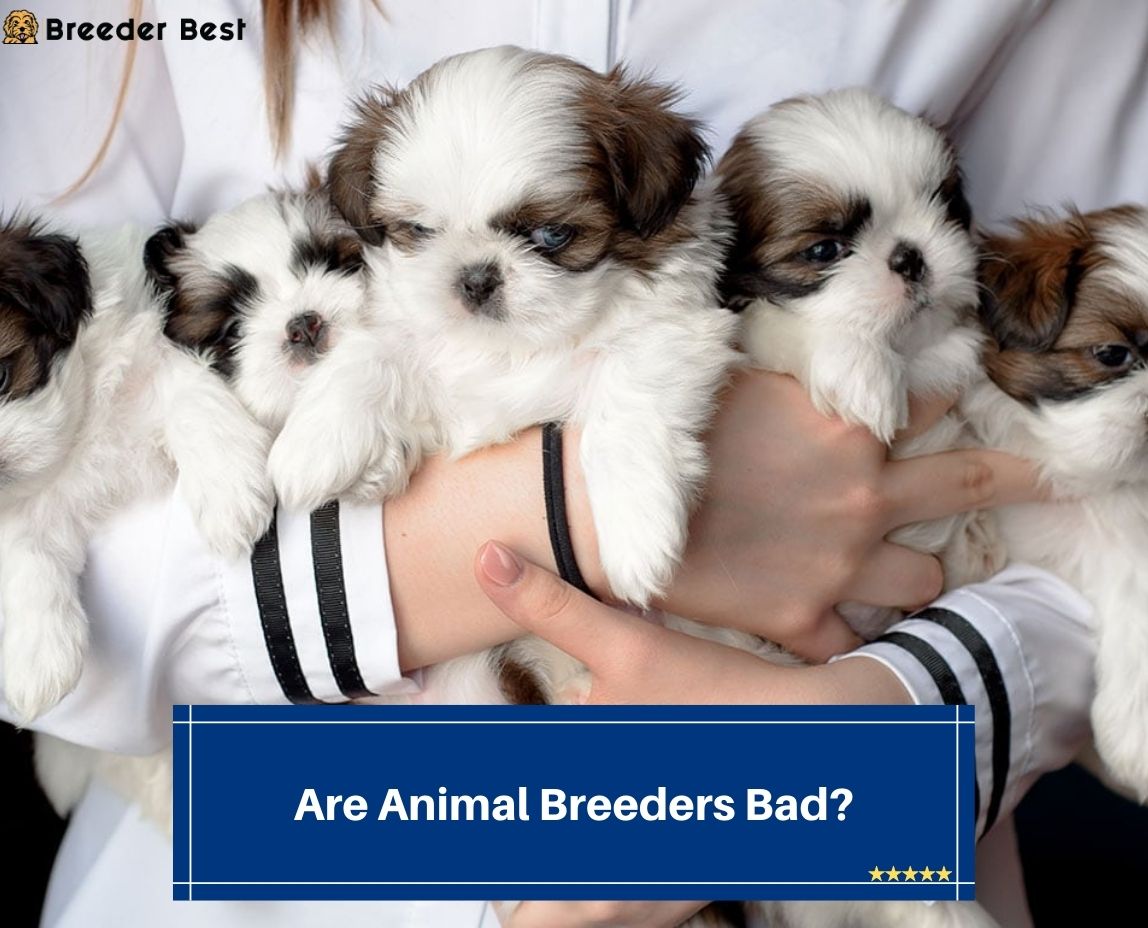One of the more charged debates in animal management is over professional breeders. “Are animal breeders bad,” or, more appropriately, are all breeders bad, is a common question, as is whether it is ethical to purchase animals from them.
Like everything in life, nothing is absolute, and the answer to the question of the ethics of breeding comes down to the person breeding the animals themselves. Here are a few thoughts on the issue.
Other articles you would like: How Often Can You Breed A Dog? and Animal Breeding For Disease Resistance.
Are Animal Breeders Bad?

Anything that generalizes the goodness or badness of a particular group of people is probably not a true statement. There are exceptions, of course, but usually, those exceptions prove the rule. The goodness or badness of animal breeders depends on the breeder in question.
There are certainly unethical and even criminal breeders. People who breed animals for fighting rings jump immediately to mind, as do people that breed exotic animals, like pythons or some reptiles.
Those breeders must know the animals they are selling usually end up being mistreated or thrown into the wild. Some follow a strict Code of Ethics as defined by the National Association of Animal Breeders.
Perhaps the largest segment of breeders falls into a gray area that occasionally skirts the rules but mostly follows the Code of Ethics as best that they can. The following are a few examples of how breeders could push the limits or even get into trouble, but not because they are unethical breeders so much as fallible human beings.
- Raising too many animals at one time results in overcrowding
- Not breeding specifically to improve the bloodline of the breed
- Failing to get health screenings beyond the basics
- Selling animals before they can be safely transitioned to a new home
- Failing to research the background of the people buying the animals fully
- Letting minor animal defects slide when selling animals
- Not maintaining fully adequate facilities
- Engaging in questionable, if not deceptive, advertising
- Failing to present a buyer with the appropriate paperwork
- Using parent-animals that produce offspring that are free from serious defects but often produce animals with health issues
These are just a few reasons why an animal breeder may not be a bad person or unethical breeder but may fall askew of common ethical standards. In the right situation (or wrong situation,) these breeders might be considered unethical or bad. But most breeders simply make mistakes and do not violate their ethical code regularly or intentionally.
Bad Breeder Behavior
While most breeders are well-meaning if misguided, some breeders engage in unethical and even criminal behavior regularly and intentionally. Some of their actions include:
- Breeding animals they know are overbred
- Neglecting to provide adequate care to their animals
- Breeding animals for criminal enterprises (like dogfighting rings)
- Running “puppy mills”
- Selling breeder services of an animal they know have health issues
- Allowing animals to be taken by customers before they are ready
- Breeding and selling illegal animals (pythons, alligators, wild animals, etc.)
These are just a few behaviors that unethical breeders will engage in as they sell their animals. You will notice that in every case, the motivation for engaging in unethical or criminal behavior is money.
Two Case Studies
In a New England state, a horse breeder with a good reputation fell on hard times and struggled to maintain her breeding service to high standards. Because she had health and financial issues, she neglected her animals.
The animals were not exercised, had degrading living conditions, and were exhibiting indications of some health issues. Eventually, law enforcement got involved. The breeder lost her stock and faced charges of negligence in the care of an animal.
In another case happening right now, all over the USA, breeders are running puppy mills with little regard for the health and welfare of the animals. They are only concerned with selling the animals and frequently sell puppies before they are ready to leave their mother’s care.
The behavior of these breeders has resulted in diminished purebred stock and the standardization of animal health issues that used to be rare.
Generalities Rarely Pan Out
Are both of those breeders cut off the same cloth? The first exhibited bad judgment but had good intentions she could not fulfill. The other is wantonly harming animals to make a profit.
Most people would argue that the first person is misguided and wrong, but not unethical. Those same people would argue that the second group of people are unethical and engage in cruel, negligent, and in some cases, criminal behavior.
The Verdict: Are Breeders Bad?
Those two cases illustrate that there are bad breeders, to be sure. Some breeders make bad decisions. The two are not on the same level ethically or morally.
So no, breeders are not inherently bad. Most breeders are highly ethical. As with anything in life that involves making a quick buck, however, some breeders are at best unethical and, at worst, bad people.
Why Animal Breeders Are Bad

As the examples above show, not all breeders are bad. Most are well-intentioned and provide a valuable service. In addition, much of the perception that all breeders are bad comes down to the type of animal being bred.
Dog Breeders
Dog breeders are perhaps the most criticized because many people who should not be in the breeding industry get in because it seems like an easy way to make money. After all, the only equipment you need, they reason, is a place to keep the animals, a yard to exercise them, and a way to get them to potential customers.
Even well-meaning breeders can fall into that trap, never realizing the work, responsibility, and cost associated with being a reputable, ethical and responsible dog breeder. Then some truly are unethical.
Those people do not care what happens to the breed, if the puppies are ready to be sold, or what happens to the puppies as long as they get paid. These are the people that give all breeders a bad reputation.
Livestock Breeders
Most livestock breeders have a good reputation. Usually, when there is a problem with livestock breeders, it follows a similar pattern to the example of the breeder that fell on hard times. If there is a problem, even if it seems like the result of unethical behavior, the root cause of the issue is not a lack of ethics but life circumstances.
Unethical breeders are not known to operate in livestock circles because of the buyers. People who purchase livestock want that livestock in the best condition possible. Selling calves before they wean from their mothers, for example, hurts the calves, which hurts the cattle purchaser.
Breeders Of Other Pets
This category of breeder can go in many directions. There are undoubtedly unethical and even criminal breeders. Selling exotic animals and invasive species jumps immediately to mind. Many breeders, though, are legitimate.
An example is pet bird breeders that adhere to a strict code of ethics and always follow the law in their treatment and sale of their birds. As with dog breeders, however, the bad tarnishes the good.
Why Do People Hate Animal Breeders?

People hold animal breeders in lower regard because of those caught breaking the law or behaving unethically. Ethical breeders rarely get coverage from the media. What do get coverage are the breeders that sold illegal animals, ran giant puppy mills, or sold animals for criminal enterprises.
That trend holds in anything that the media covers. A good example is pro sports. You rarely hear about the good guys but can rest assured that you will hear about the player with legal problems or that got busted for OUI. That concept is why animal breeders have the reputation they do in certain circles.
Why You Should Never Buy From a Breeder
Buying from a breeder, or deciding not to do so, is another example of using a generalization to influence a specific and subjective decision. In some cases, buyers have no choice but to go through breeders. Those types of situations involve the following types of animals:
- Cattle
- Horses
- Sheep
- Goats
In each case, you might find some for sale on the general market, but you have far better odds if you go through a reputable breeder.
Another class of animals that must go through a breeder is show animals. You will not find a purebred dog, for example, at the local animal shelter. If you are interested in showing horses, you will not find a show horse at a flea market. In these cases, breeders are the best and, in many cases, the only resource.
In some cases, you should avoid breeders or at least carefully scrutinize them heavily before agreeing to any purchases. These include:
- Breeders of animals for criminal enterprises (vicious dogs, exotic and illegal animals)
- Breeders of animals that are invasive species (snakehead fish in the USA)
- Breeders that run puppy mills
- Breeders have known to sell animals before they are ready
- Breeders that cannot produce sufficient authentication paperwork for their animals
In almost every case in that list, the intent of the breeder is unethical. You should stay away from them.
Conclusion for Are Animal Breeders Bad?

So, to answer the question ‘are animal breeders bad?’ – not all breeders are bad like not all politicians are crooked. The crooked politicians, however, taint the reputation of the good politicians. The same holds for animal breeders, but if you are careful, you can find a breeder that is ethical and worthy of your business.
You will also like:

